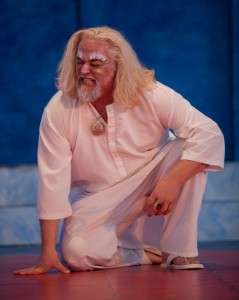SHAKESPEARE FESTIVAL: Stephen Harper the Julius Caesar of his time?
Well, they don’t stab kings anymore. They just assassinate their character. But politics has changed little since politics was invented. Actor Kevin Sutley – who plays the titular character in William Shakespeare’s Julius Caesar at the Freewill Shakespeare Festival – puts it like this, “This play is incredibly political, and it’s about the politics of human beliefs. I don’t think that’s changed since Shakespeare’s time – or Caesar’s time.”
Julius Caesar opens Tuesday at the Hawrelak Park’s Heritage Amphitheatre, alternating nights until July 29 with a lighter Shakespeare work, The Tempest, where Sutley plays Gonzalo, “the good through talkative supporter of the king.”
Oh, it’s not hard to find parallels in Canadian politics here and there. Stephen Harper leads a majority government. Julius Caesar led a majority government. Stephen Harper made some unpopular decisions. Julius Caesar made some unpopular decisions. Stephen Harper is absolutely convinced he is doing what is best for Canada. Likewise Caesar.
“Caesar believes that he is the best person for the job,” Sutley says, “that he is the person who can make the right kind of changes to make the Roman Empire better and stronger. He has no doubts he’s doing the right thing. But people on the other side see that it probably isn’t the right thing for society.”
And so … long story short, they kill him.
Maybe ancient politics is a wee bit different than today. And judging from some of the behaviour depicted in Julius Caesar – a number of gruesome suicides not being the half of it – politicians and their wives were also different in the old days. They were crazy.
Sutley says he appreciates the research that Shakespeare obviously put into his most political play, “For me, I just think that Shakespeare has read about Roman society. This play is very full of facts. Some of the far-fetched things, like Brutus’s wife Porcia at one point stabbing herself in the leg to prove her love for her husband, or when she commits suicide, it says, by ‘eating fire.’ In fact what she did was stuff a red hot coal down her throat. Shakespeare did his research with all these little details. That really did happen.”
Most of the main characters in the saga – in fiction and fact – wind up dead before their time. That’s what you get with tragedy.
As for the parallel of decline and fall of the North American Empire, which might seem fine at the moment, Sutley points out that the Roman Empire didn’t fall overnight, “It happened gradually, over hundreds of years.” Why, the Roman citizens probably barely noticed it until homeless Visigoths were camping in their bathhouses.
It is possible to read too much into something that there’s already a lot to read into. Though he doesn’t have to actually wear the toga – this production going for a more surreal approach to costume and set design – Sutley has plenty to deal with playing the doomed emperor, even in death, as a ghost. It’s a contrast to his other role in The Tempest – which is “very hopeful and positive and full of sunshine,” he says, conceding that Julius is a bit more challenging. “There’s an element of madness in it that we’re going for with the character. He is very paranoid.”
You can stop making comparisons to Canadian politics now.












